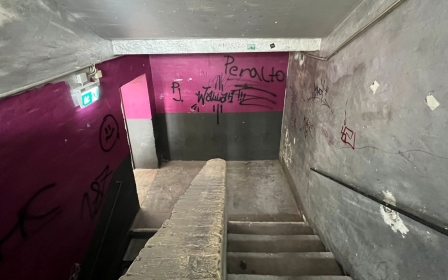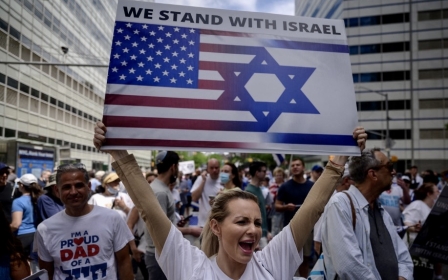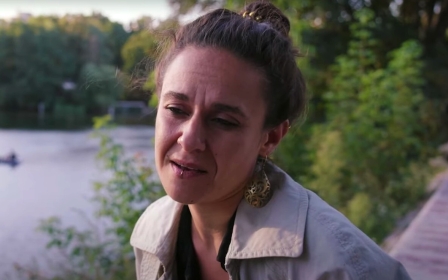How German guilt is being used to silence Palestinians

"After some consideration, the Goethe-Institut decided that Mohammed el-Kurd was not an appropriate speaker for this forum: in previous posts on social media, he had made several comments about Israel in a way the Goethe-Institut does not find acceptable."
This is how the Goethe Institut, a German state-funded cultural association, justified its decision to disinvite prominent Palestinian writer and journalist Mohammed el-Kurd from speaking at its conference "Beyond the Lone Offender".
“Appropriate” and “acceptable” are not random here - they reflect a deeply enshrined approach in Germany towards the Palestinian cause. It’s patronising: “We, the Germans, can teach you, the victims, from our comfort zone, what should or should not be said about your oppressor."
Being haunted by their past, Germans are trying to export their feelings of guilt onto the shoulders of Palestinians
But it also shows how Germans are subject to a ministry of thought when it comes to Israel. The “appropriate” and “acceptable” is not according to German criteria, it’s what Israel considers appropriate and acceptable.
Being haunted by their past, Germans are trying to export their feelings of guilt onto the shoulders of Palestinians. Antisemitism is not their problem anymore - it is the Palestinians’. Palestinians who are not going to bear this responsibility and apologise are not appropriate and acceptable voices.
What the Goethe Institut did is delegitimise Kurd's voice and everything he represents. It will be hard from now on for any German institution to invite Kurd. The standard has been set. His voice is not acceptable and appropriate for Germans.
Anti-Palestinian discourse
This disinvite was accompanied by almost complete silence in German society. Except for a few Germans who dared cancel their attendance in protest against Kurd's cancelling, not a single institution, politician or public figure dared utter a word.
Last May, Berlin's police banned several Nakba Day protests. When hundreds of activists took to the street despite the ban, they were faced with brutal attacks by the police, who detained scores of them. In one clip, shared by Human Rights Watch, an officer tells a woman she is being held because "she shouted ‘Free Palestine'".
The German media that covered the Goethe Institut story dealt with it as news, repeating the Institut statement. Kurd was not asked to comment. This is the way Germany deals with us: talking about us, without us.
The anti-Palestinian practices and discourse has been on the rise in recent years. It’s not just populist behaviour in the streets among right-wing groups. It’s not in the margins. It’s in the mainstream - among officials, elected representatives, official institutions, civil society and media.
Journalist Nemi el-Hassan was fired by the German channel WDR after a right-wing activist published a photo of her on an al-Quds March in Berlin in 2014, when she was 17, way before she became a journalist. The way the German media joined the attack on her and treated her as a sinner who needed to apologise was shameful.
Germany’s state broadcaster Deutsche Welle (DW) recently fired seven Arab and Palestinian journalists over their social media posts it condemned as “antisemitic”. Just last month, an exhibition of Palestinian artists' work as part of the renowned art festival Documenta 15 in the city of Kassel was targeted with racist vandalism.
Numerous lectures and events have been cancelled over recent years after pressure and accusations of antisemitism.
A very dark place
In 2019, Dr Anna-Esther Younes, a German-Palestinian academic, was disinvited from speaking at an event after a secret dossier compiled about her was shared with organisers. A secret dossier!
It’s not anymore about Germans being afraid to speak up - that job has long been accomplished; Germans often refrain from any criticism of Israel or showing any solidarity with Palestinians. It is now also leading to Germans refraining from defending the right of Palestinian voices to be heard.
This silence is allowing anti-Palestinian sentiment to settle deeply in the society’s mindset, beyond the right-wing or the Zionist lobby
This silence is allowing anti-Palestinian sentiment to settle deeply in the society’s mindset, beyond the right-wing or the Zionist lobby.
This is a process that can get us to a very dark place. It is terrifying to think that this is happening in a country that has so much to learn from its own history. It is a threat to Palestinians in Germany, depriving them of a safe space to speak about their own cause in public.
The attempt by Israel’s defenders to make being pro-Palestinian rights synonymous with antisemitism is destructive for Palestinians in Germany on so many levels. It asks generations of Palestinians in Germany to regulate their identity and feelings about their homeland in a manner that is appropriate and acceptable for their oppressor.
What will come next? Forcing Palestinians to hide their identity so as not to be hunted in the streets?
This should be extremely alarming for Germans. Trying to rid yourself of a dark past towards one group should not happen by creating a dark present for another.
The views expressed in this article belong to the author and do not necessarily reflect the editorial policy of Middle East Eye.
Middle East Eye propose une couverture et une analyse indépendantes et incomparables du Moyen-Orient, de l’Afrique du Nord et d’autres régions du monde. Pour en savoir plus sur la reprise de ce contenu et les frais qui s’appliquent, veuillez remplir ce formulaire [en anglais]. Pour en savoir plus sur MEE, cliquez ici [en anglais].






